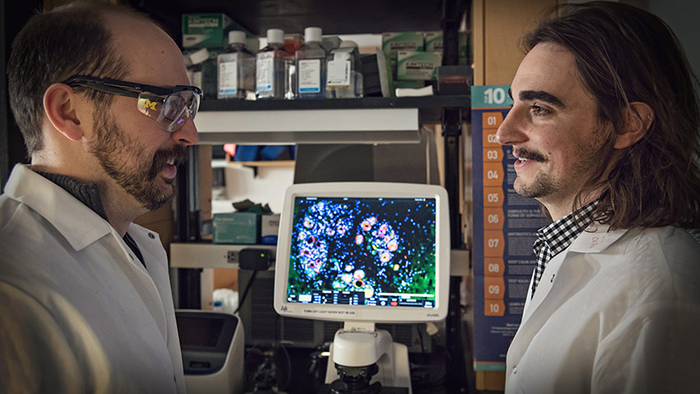Hyaluronic acid, or HA, is a known presence in pancreatic tumors, but a new study from researchers at the University of Michigan Health Rogel Cancer Center shows that hyaluronic acid also acts as food to the cancer cells. These findings, recently published in eLife, provide insight into how pancreatic cancer cells grow and indicate new possibilities to treat them.

Credit: Credit: Leisa Thompson
Hyaluronic acid, or HA, is a known presence in pancreatic tumors, but a new study from researchers at the University of Michigan Health Rogel Cancer Center shows that hyaluronic acid also acts as food to the cancer cells. These findings, recently published in eLife, provide insight into how pancreatic cancer cells grow and indicate new possibilities to treat them.
“A central driving theme in my research lab is that pancreatic cancer doesn’t respond to the common arsenal of treatment approaches. We need to think about this challenge differently,” said Costas Lyssiotis, Ph.D., the lead investigator on the study. He and his team study the metabolism of pancreatic cancer in preclinical models: how cells obtain nutrients and the spectrum of nutrients they utilize to fuel growth and enable therapeutic resistance.
The tumor microenvironment, or the cells that make up the tumor, are a combination of many different cell types, some malignant, some not. A pancreatic tumor’s microenvironment is highly stromal, meaning the mass itself is mostly comprised of connective tissue and non-cancerous immune cells.
“Stroma occurs in the body’s natural scarring process,” Lyssiotis explained. “As these scars are formed, an abundance of hyaluronic acid gets released.”
Hyaluronic acid—a polymer or long chain of sugars—is great at attracting and retaining water. When a lot of it is present, pancreatic tumors become hyperdense, collapsing veins and blood flow. Lyssiotis says these tumors become very hard.
“It’s not that there aren’t veins or arteries inside the tumor. But the vasculature that is there can’t withstand the extreme pressure.”
Most studies of hyaluronic acid in pancreatic cancer have focused on its role in creating this density. A recent unsuccessful clinical trial even explored ways to degrade hyaluronic acid and release pressure on the tumors to allow the vasculature to expand and deliver drugs, which are typically difficult to administer given the lack of blood flow.
Lyssiotis and his lab wanted to understand hyaluronic acid beyond its contribution to the physiological make-up of pancreatic cancer cells. They considered the density of these tumors, and wondered: If cancer cells aren’t getting access to blood-derived nutrients, how are they getting the nutrients that fuel cell growth and become tumors?
The lab’s new work indicates that one way cells do this is by scavenging the hyaluronic acid itself.
“Hyaluronic acid doesn’t only affect tumors by creating this density, which does make it difficult to treat,” Lyssiotis said. “It is literally a chain of sugars. In retrospect, it makes good sense that the malignant cells are also feeding off hyaluronic acid.”
Lyssiotis says this study demonstrates just how well pancreatic cancer cells scavenge nutrients in order to maintain their survival and growth.
“We’ve added another example into a growing body of evidence of the nutrients and pathways we didn’t think cancer cells would use to scavenge.”
This study is co-published with a team led by Kathryn Wellen, Ph.D., at the University of Pennsylvania. Her lab showed that inhibiting the sugar scavenging pathway blocks tumor growth. Together, these studies demonstrate new opportunities through which to better understand the nuances of pancreatic cancer.
“People have been studying hyaluronic acid in pancreatic cancer for 20 years and no one had ever thought to see if it could be a nutrient for cancer cells,” Lyssiotis said. “We’re going to dig deeper into this idea and see if it represents a therapeutic vulnerability that can be drugged.”
Paper Cited: “Hyaluronic acid fuels pancreatic cancer cell growth,” eLife. DOI: 10.7554/eLife.62645
Funding was provided by the National Cancer Institute (T32AI007413; F31CA243344; K99CA241357; F31CA24745701; R01CA237466; R01CA252037; R21CA212958; P30CA008748; P30 CA046592; R37CA237421; R01CA248160; R01CA244931; F99/K00CA264414); National Institute of Diabetes and Digestive and Kidney Diseases (Postdoctoral Support P30DK034933, U24DK097153; Stand Up To Cancer; Thompson Family Foundation; STARR Cancer Consortium; American Association for Cancer Research; V Foundation for Cancer Research ; Sidney Kimmel Foundation; Charles Woodson Research Fund; U-M Pediatric Brain Tumor Initiative; and the National Institute of Child Health and Human Development (T32HD007505).
Journal
eLife
DOI
10.7554/eLife.62645
Method of Research
Experimental study
Subject of Research
Cells
Article Title
Hyaluronic acid fuels pancreatic cancer cell growth
Article Publication Date
24-Dec-2021




